BROKEN PROMISES
Through thick bush, up hills and across rivers – Eastern Cape learners’ long trek to school
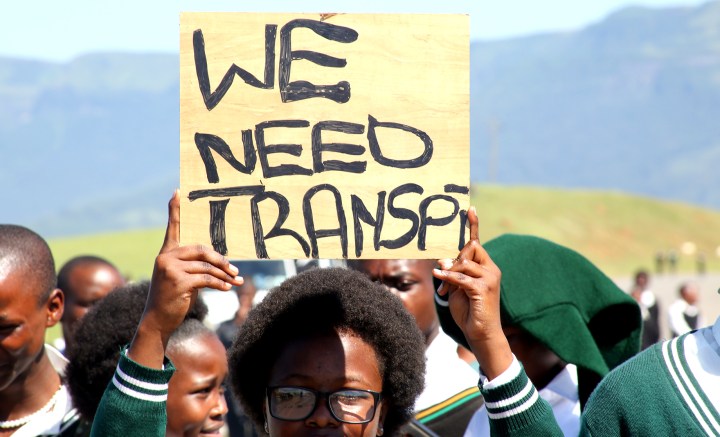
Lack of government action has left a trail of exhausted children and worried parents as they navigate downright dangerous daily treks to school. As its term draws to a close, this is the third provincial government that has failed to sustainably provide learner transport in the region, despite court cases, consistent damning findings by the Auditor-General, a report from the South African Human Rights Commission, pleas from school governing bodies and community protests.
Thousands of Eastern Cape children still leave home at 5am or 6am for a two-hour walk, often through rivers, to get to school. Their shoes wear out. Their books get wet. They drop out of school because they are exhausted.
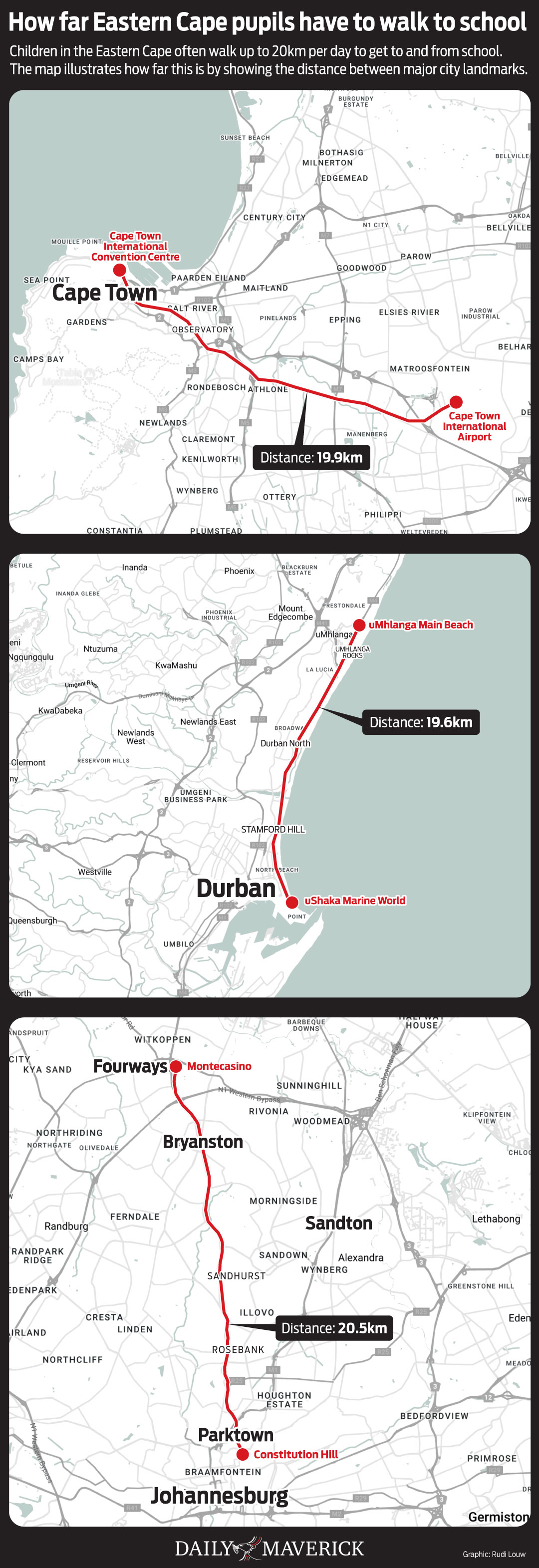
Many walk in total 20km to school and back in a day – the equivalent of a half marathon. They often only return home at 6pm, preferring to walk in groups because they are scared.
Some parents and village elders, fearful of letting the children walk unsupervised, make their way to school and back twice a day, walking more than 40km a day as they walk to school and back in the morning and again later in the day to collect the children.
When the rivers are full, parents carry their children’s school uniforms in buckets, and after the children are helped to the other side, they dry off and change into their school uniforms before continuing. This happens even in winter.
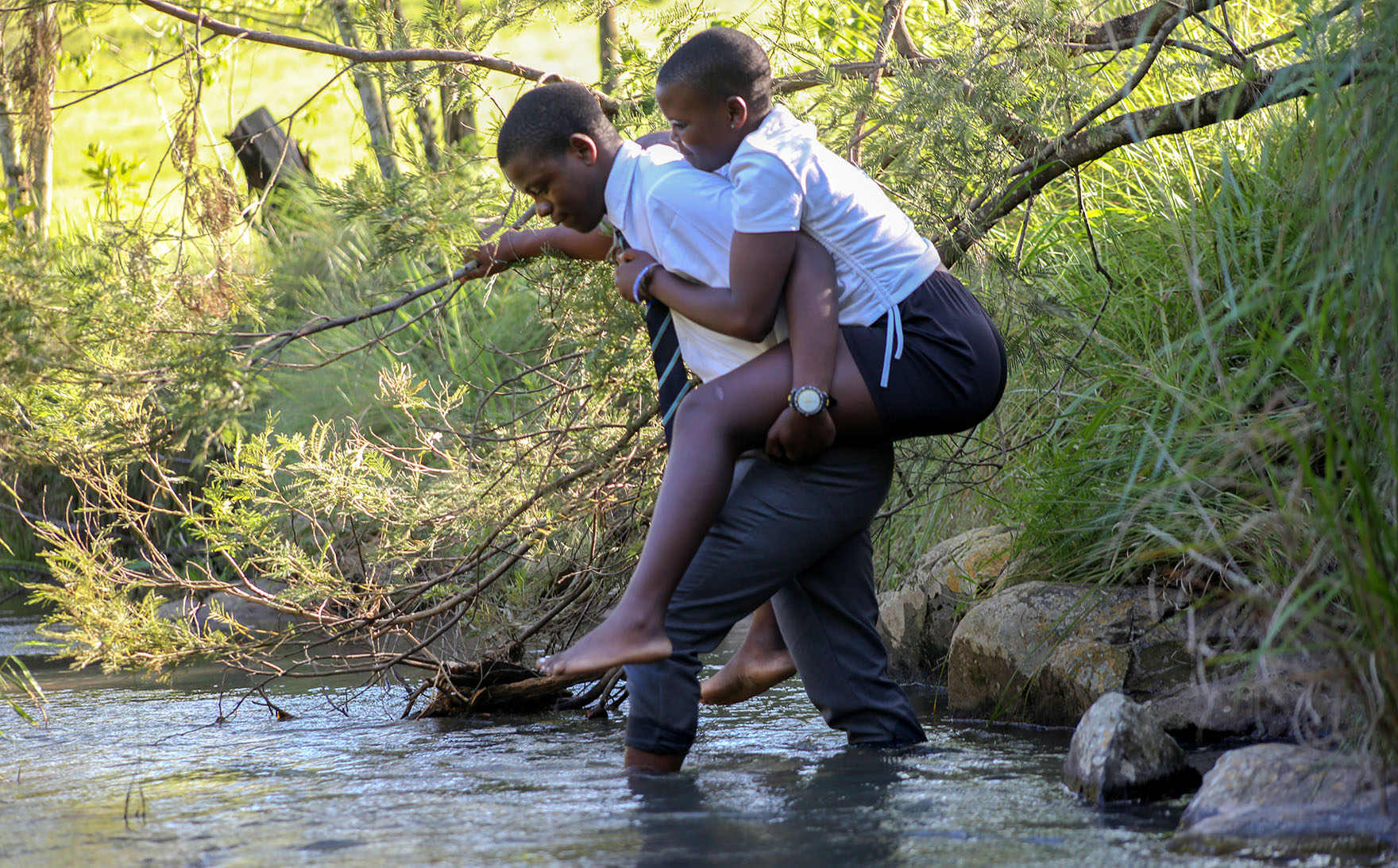
Shukuma Senior Secondary School learner Thulani Mbube helps a younger schoolmate cross a river on their way to school. (Photo: Hoseya Jubase)
Legal action
Despite a promise to the Eastern Cape legislature in 2015 that all who needed it would get learner transport by 2019, Eastern Cape parents are, with the help of the Legal Resources Centre in Makhanda, again heading to the high court in May to ensure transport to school for their children.
The team from the Legal Resources Centre has filed an urgent application against the provincial and national governments on behalf of the Khula Community Development Project and the school governing bodies of three schools – Mneketshe Junior Secondary School (JSS), Sea View Senior Secondary School and Toyise Senior Secondary School.
The urgent application seeks to compel the provincial government to provide transport to those eligible and qualifying learners who are not being provided with transport.
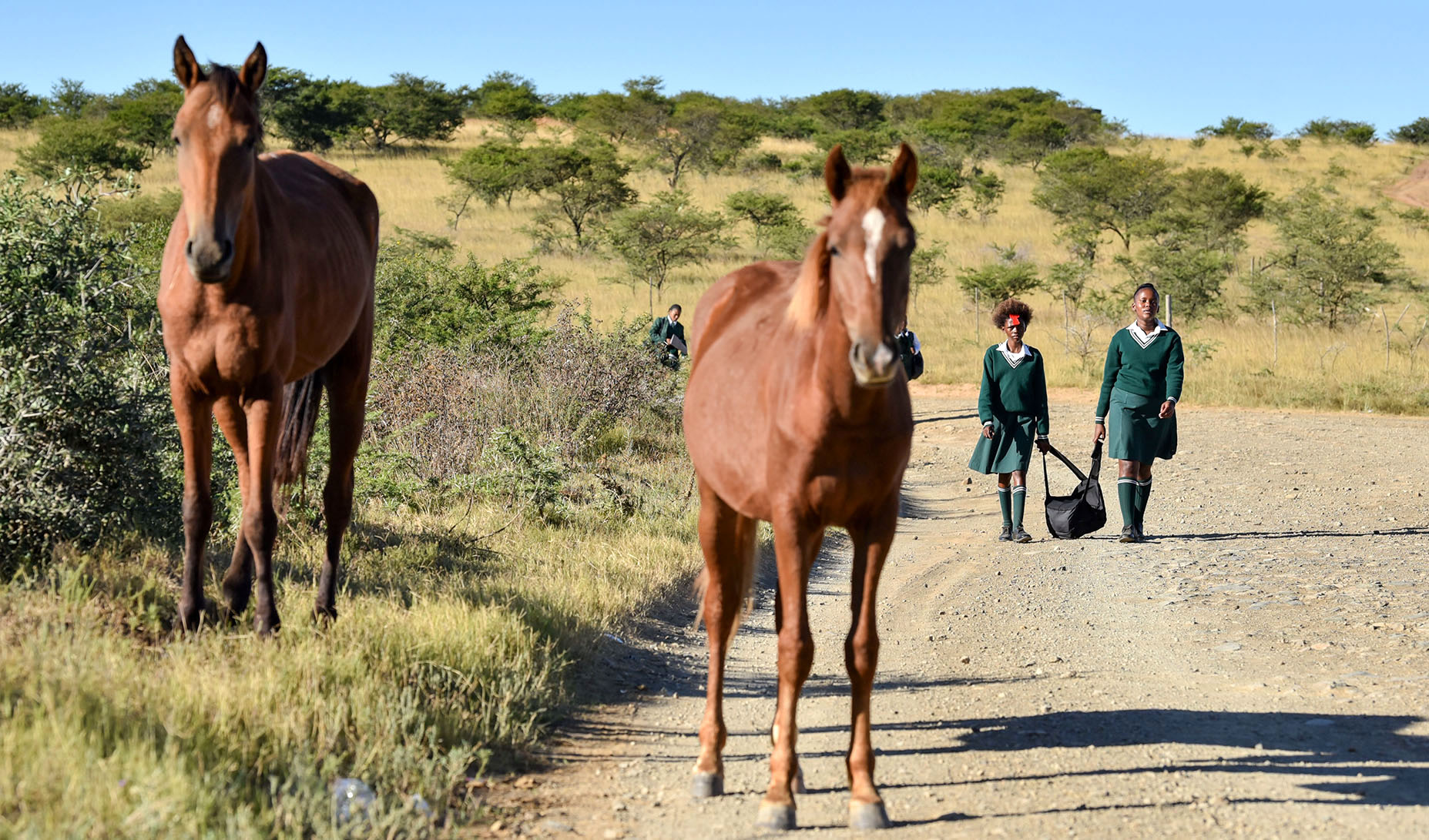
Learners from Ntabenkonyana Senior Secondary School in Xesi, Eastern Cape, on the last stretch of their 10km walk. (Photo: Deon Ferreira)
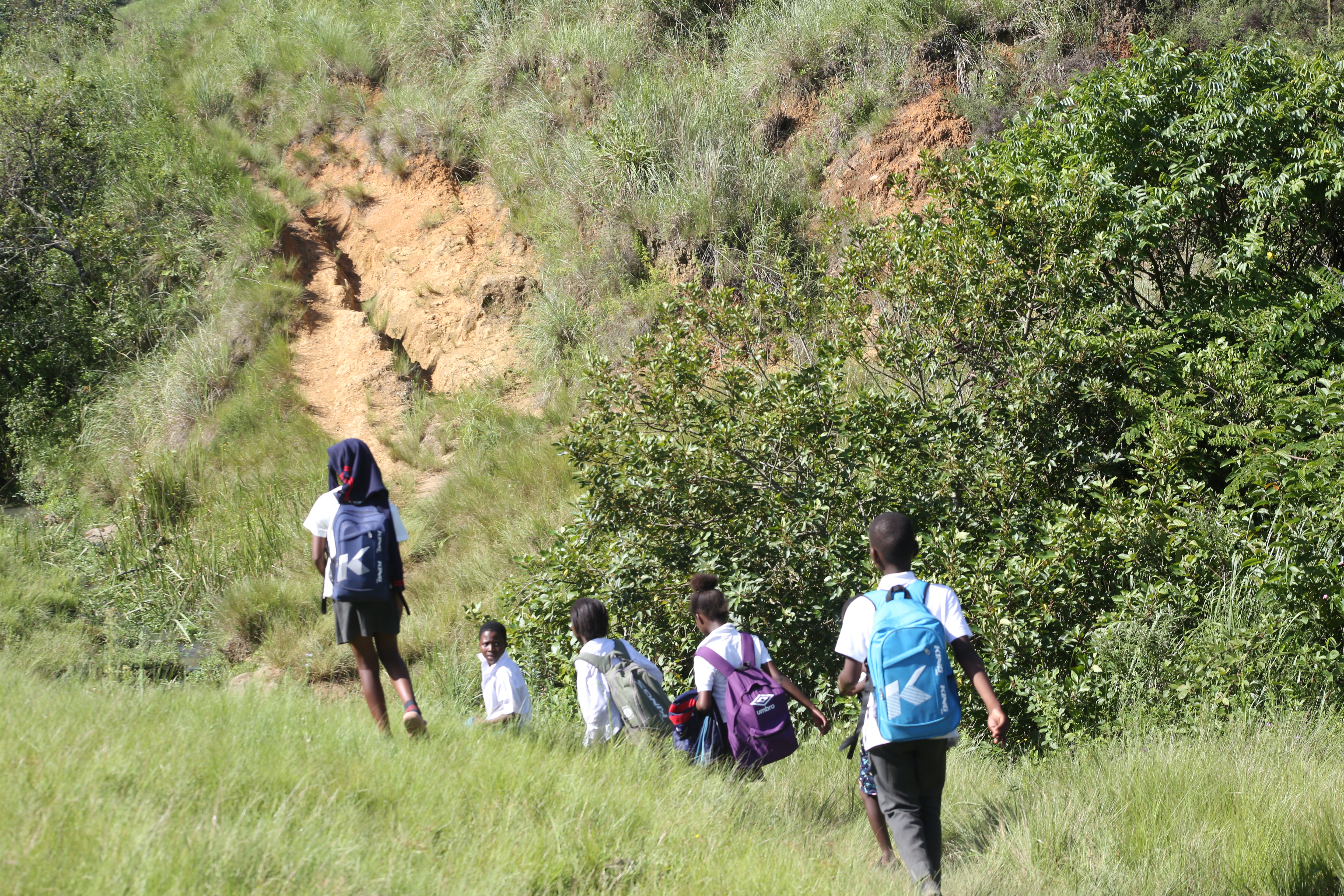
Ntlozelo Junior Secondary School learners return home in Bizana, Eastern Cape on 31 January 2024. (Photo: Hoseya Jubase)
Lawyers are asking the court to order that outstanding learner transport applications are finalised, that the Department of Education develop and implement a catch-up plan for learners who have missed school on account of not receiving transport, and devise a plan to ensure that a similar failure does not occur at the start of the 2025 academic year.
South African courts have previously held that the right to education is rendered meaningless for learners who are denied transport to school in circumstances where they require it.
The government departments will oppose the legal action.
Crossing rivers
The chairperson of Mnketshe Junior Secondary School’s governing body, Nkosiphendule Ndlebehangu, said the school was at the top of a steep mountain escarpment near Flagstaff. To make their way to school, 143 young children (the school has learners from Grade R to Grade 9) must walk through dense vegetation and cross the Mzintlava River.
The province’s policy is that children living further than 5km from their school will be considered for learner transport. Ndlebehangu said 143 children living in villages on the other side of the river walk “significantly more” than 5km every day. They also have to cross a river that sometimes runs dangerously fast.
“During the dry season, learners take off their shoes, cross the river, put their shoes back on and walk to school. During the rainy season, parents put learners’ school bags, uniforms, towels and lotion in buckets and drums and carry these across the river. They help the learners cross the river. Once the learners have crossed, they dry off, put on lotion, get dressed and walk to school,” Ndlebehangu said.
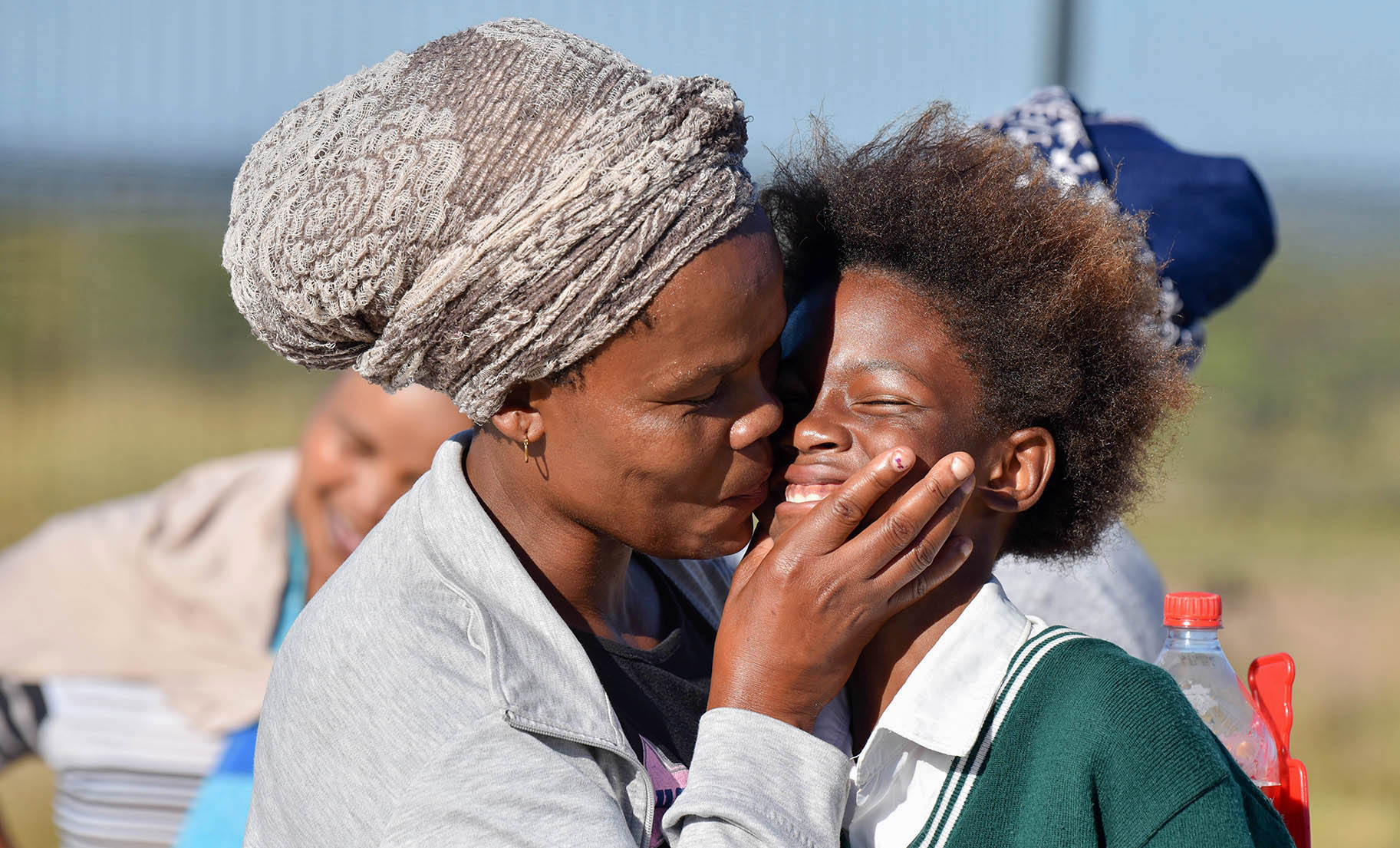
Nosi Ntsomi from Mngqulweni Village, Eastern Cape, comforts her exhausted daughter who is in tears as they reach school at 8am after leaving home at 5.30am. (Photo: Deon Ferreira)
He said school parents had tried to pay for private transport (most pay around R400 a month) but could only afford two months.
“Almost all the parents are unemployed and rely on social grants,” he said.
He said that between 2016 and 2018, after being told that the education MEC would consider a request for a satellite school, the parents were left with only a “strong feeling of defeat and discouragement” as they never received an answer.
The department also didn’t respond to lawyers’ letters from the Legal Resources Centre.
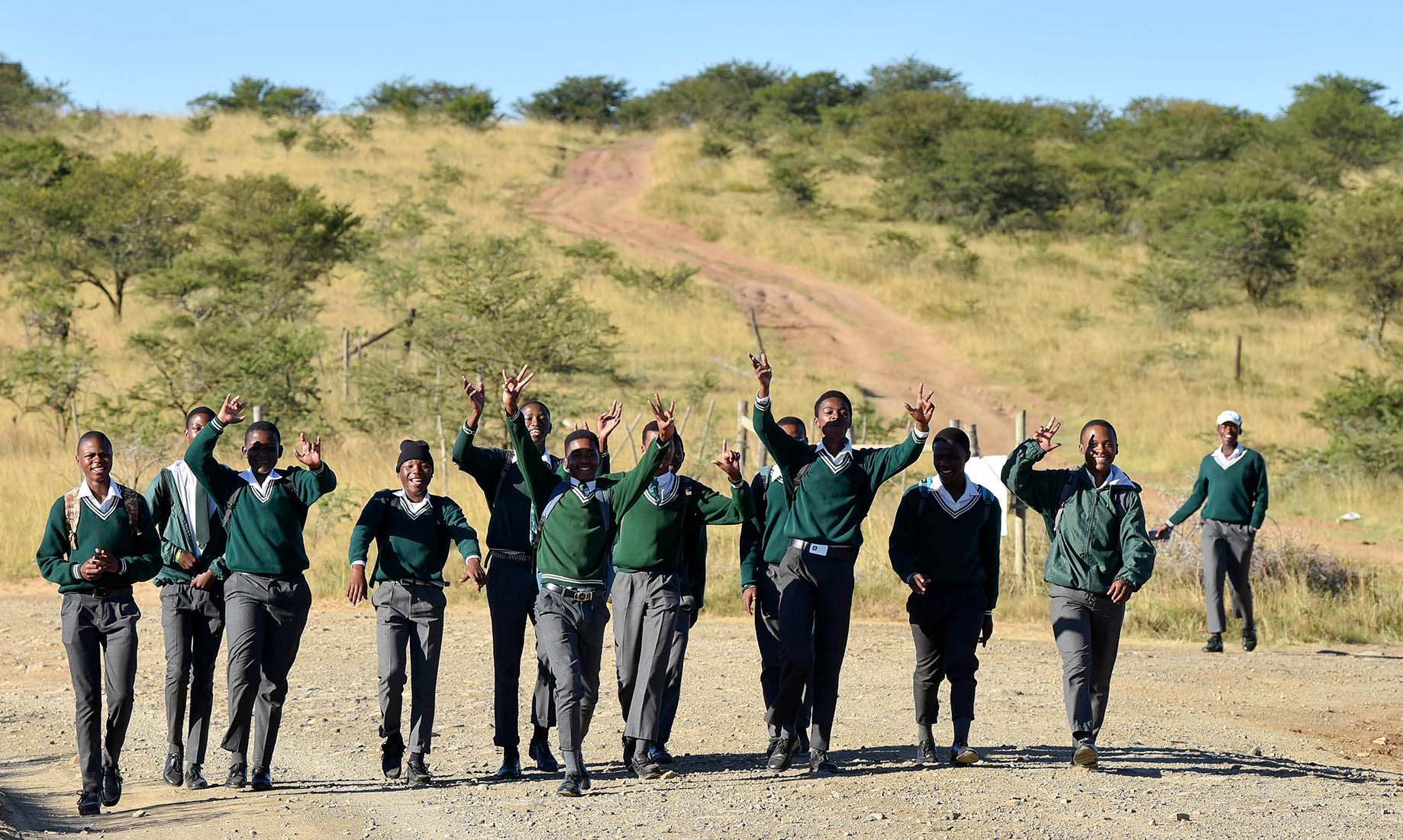
While the hour-long walk to school is up a steep hill, learners from Ntabenkonyana Senior Secondary School in the Eastern Cape use the easier downslope to catch up with friends and crack jokes. (Photo: Deon Ferreira)
Becoming desperate, as absenteeism and drop-out rates soared, parents started a satellite school in a mud church with a badly leaking roof, one teacher, three assistants and 73 learners.
“The school is neither sanctioned nor funded,” he added. “The SGB pays for them.”
“Children were unable or unwilling to walk the long distance to school every day,” Ndlebehangu said.
In February 2024, the school was told that 45 learners would get transport but no starting date was given. Ndlebehangu said this left 98 without transport to school.
Starting school late
Nqunti Ntshantsha, a retired grandfather of two, said one of his grandsons, Lindokuhle, is now 23 but started school late because of the distance to school.
“I waited until he was strong enough to walk the long distance up the hill every day to Mneketshe. Ntshantsha said his grandson refused to go to school for two years.
“He only went back after I begged and motivated him to do so. He is doing very well. The teachers say he is bright.”
Dr Eileen Carter, the provincial head of the South African Human Rights Commission (SAHRC), said the commission often received reports of grandmothers holding their grandchildren back from starting school, in cases where the road to school was difficult to navigate, had difficult river crossings or crossed dangerous terrain.
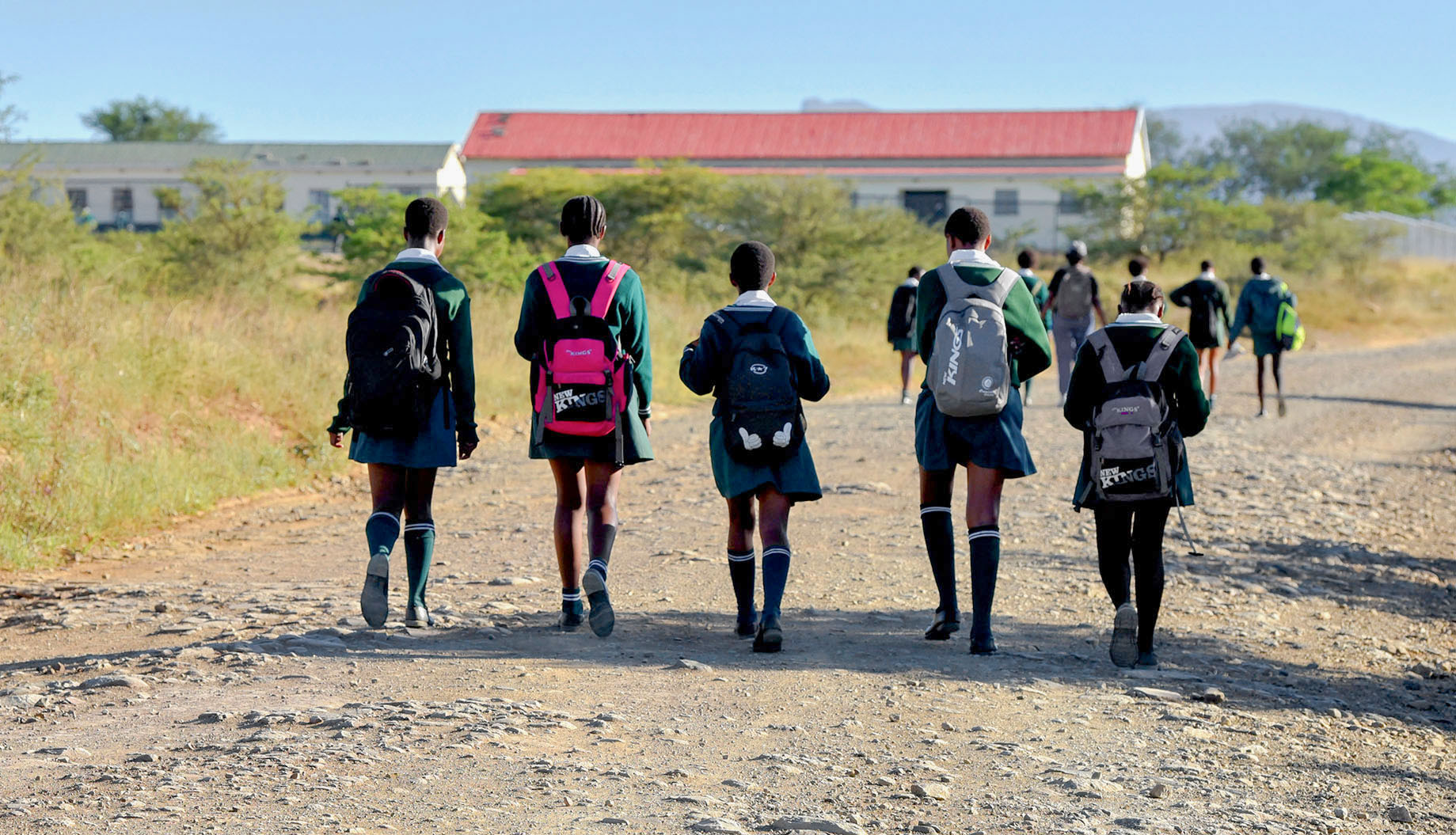
Children from Ntlozelo Primary School in Mbizana in the Eastern Cape walk home from school. They have no scholar transport. (Photo: Deon Ferreira)
Nolufefe Mqanqala, a cook at Mnketshe JSS, said she dropped out of school in Grade 2 because of the long distances she had to walk. Now 41, she said she was envious of those who could read, write and use technology. Her son is 16 and in Grade 7.
“I always motivate my children to go to school.”
“He started walking to school in Grade 3. It is very difficult to keep him motivated. I often use myself as an example and try to inspire him to continue going to school to get educated,” she said.
Ruined shoes and books
Sithembesio Fulela, the treasurer of Sea View Senior Secondary School in Zithulele, said some learners walked 14km (one way) to school every day.
He said children were dropping out of school or missing a year of school due to sheer exhaustion.
Mkhonko Sinenkosi (15) attends school at Zithulele but lives in Talemofu Village, about 7km away. He walks about 14km a day, which includes a very steep hill.
He has given an affidavit to the Legal Resources Centre to support the case for the learner transport.
“I leave at 6am and get to school by 8.30. I worry that cars passing by might not see me and run into me. I am constantly afraid of walking alone on this road. I leave school again at 3pm and reach my home at 5pm.”
He said learners sometimes waited at school until a group was ready to walk because they were worried about their safety.
“Our shoes wear out quickly. These are not cheap to replace. Our books often get wet and damaged.”
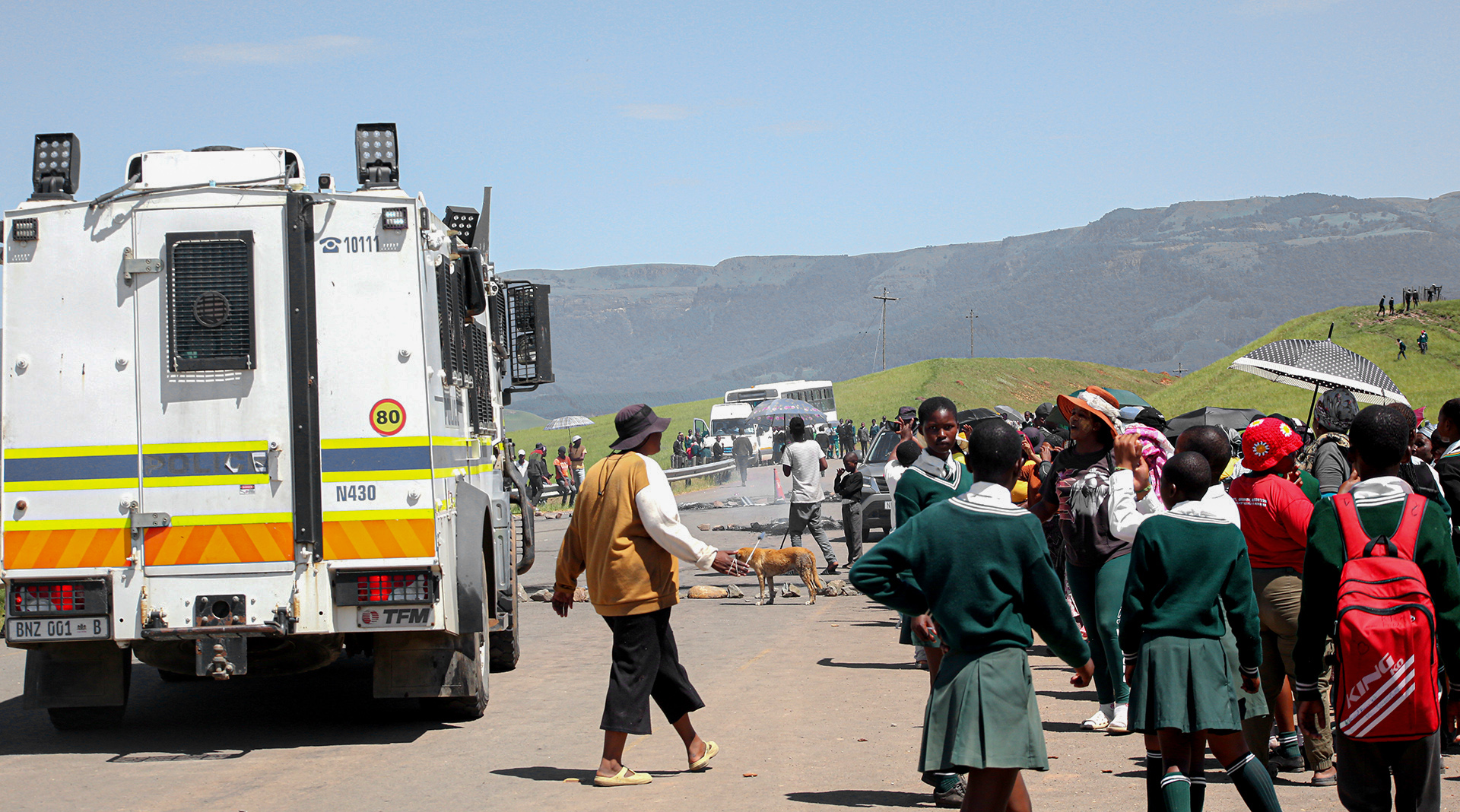
Residents block roads in Tabase, Mthatha, Eastern Cape in January this year while protesting that their children were excluded from the scholar transport system. (Photo: Hoseya Jubase)
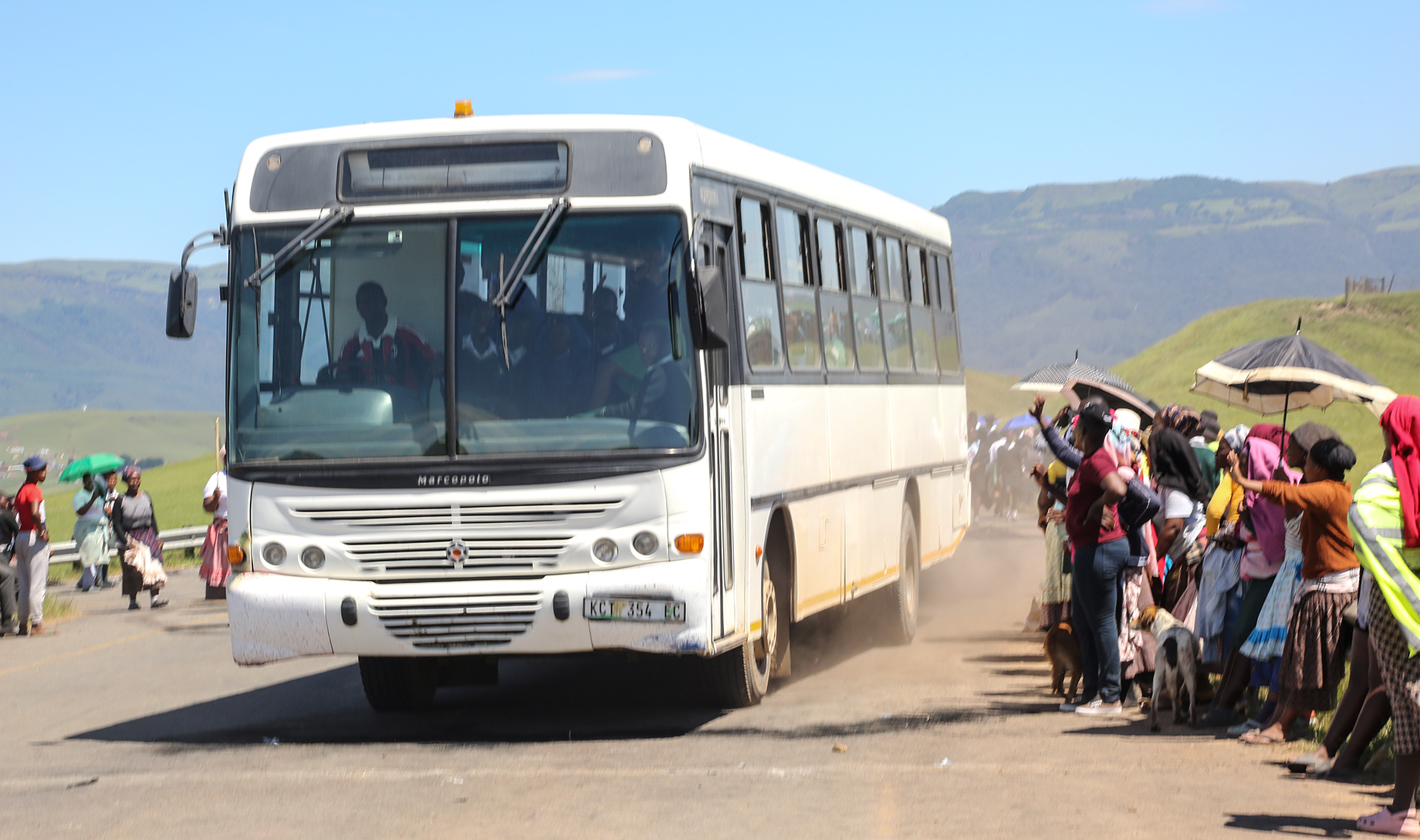
A bus taking learners to Jumba Senior Secondary School was blocked by angry protesters in Mthatha, Eastern Cape, in January 2024. (Photo: Hoseya Jubase)
Nabohola Vumile (18) is another learner who provided an affidavit to support legal action for learner transport.
Vumile, who attends school at Sea View Senior Secondary, gets up at 4am to leave at 5am as he must walk through the Mpame Forest and cross two rivers to get to school. Delays on his daily walk to school mean that he often misses the first two periods of the day.
Loan sharks
Thembinkosi Sityoshwana, chairperson of the SGB at Toyise Senior Secondary School in Quonce (formerly King William’s Town), said the problems with learner transport were particularly bad this year.
“Many children have not received transport,” he said. “This is having a devastating effect on learners and their families.”
He said the Eastern Cape Department of Education had promised communities that when they closed the small village schools, transport would be provided to children.
“None of the scholar transport operators were working at the start of the year,” Sityoshwana said. “There appears to be no reasonable method used to determine which village or route will receive transport or how many learners,” he said.
He said many children who wanted to take mathematics and physical science could do so only at Toyise.
Community member Nqabisa Nale said she had to borrow money from a loan shark to pay R400 for private transport for her daughter, who attends Toyise, as it is a two-hour walk each way, to and from school. The family’s entire monthly income is R1,750, mostly grants and a stipend from the expanded public works programme, leaving them in deep financial trouble.
Burden on mothers
Nosi Tshomi from Mngqulweni village in Xesi (formerly Middledrift) walks her children to school every day. She is one of a group of mothers who walk their children to school every day because they fear for their safety. This means they are walking four times a day, between the school and her house. For some, this is a 40km walk.
Tshomi says: “I wake up at 4.30 to prepare everything.”
They leave home at 5.30am and normally reach school at 8am. Tshomi will then return home before she sets off again to fetch the children at 2.50pm.
“It is too far for them to walk alone.”
She is part of a group of parents and elderly who accompany 43 children walking from the village on school days.
“When we start to walk I tell them we must go slowly. You mustn’t be tired when you get to school,” she said. “Sometimes the children fight or others [throw stones at them] so they can’t walk alone. It gets very cold here in winter. This is our first year to walk to this school. I don’t know what is going to happen,” she said.
Walking in solidarity
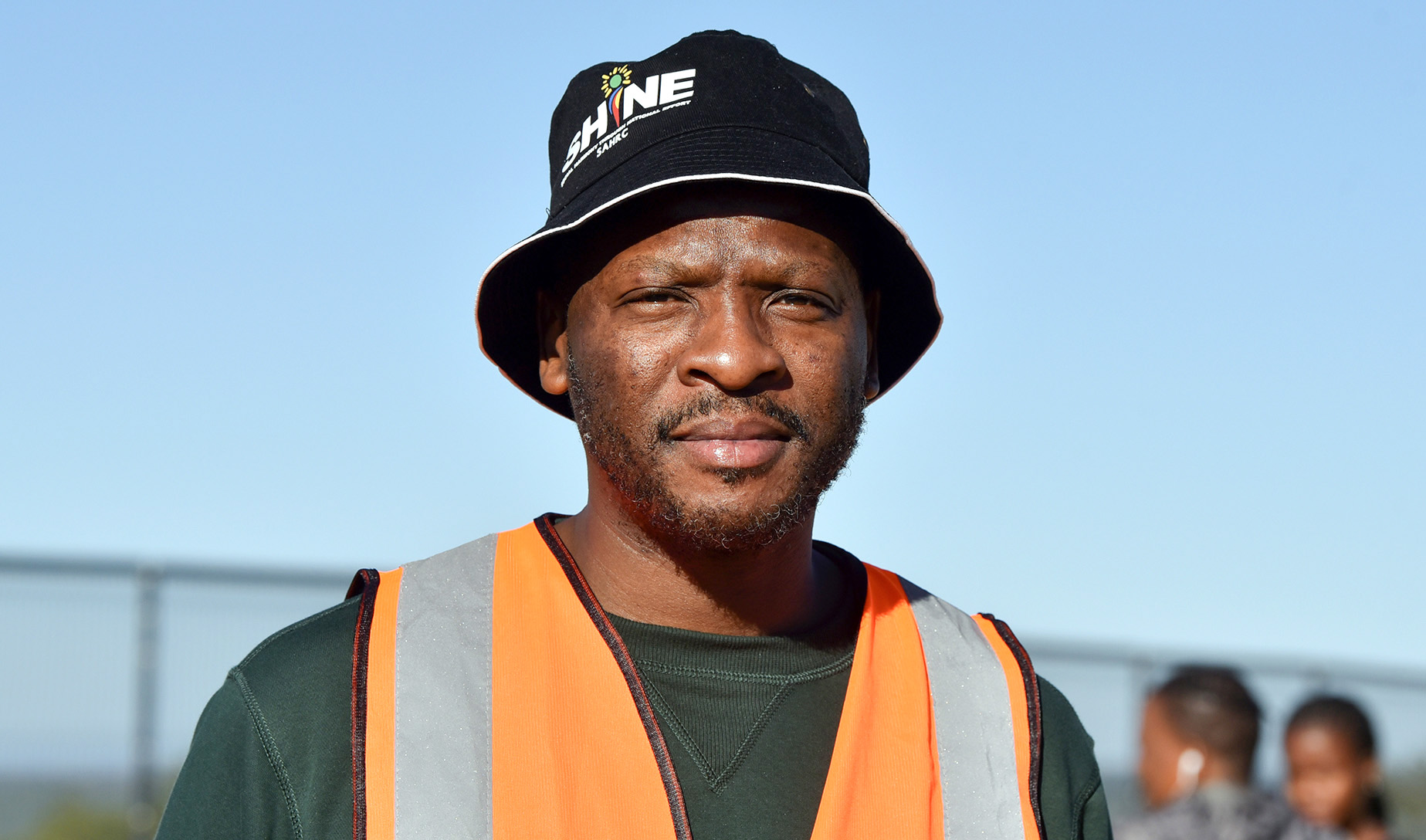
Prof Tsepho Madlingozi from the Human Rights Commission joined learners from the Ntabenkonyana Senior Secondary School, Eastern Cape on their 10km walk to school. (Photo: Deon Ferreira)
In March, to show solidarity with children who travel long distances to school, SAHRC commissioner Professor Tshepo Madlingosi walked to school with about 100 learners between the ages of 12 and 16 from Mbizana Village in Xesi.
The SAHRC had adjudicated an earlier complaint about learner transport in 2011.
Madlingosi said the walk was very difficult and left him exhausted, even though he was an experienced hiker.
“I asked them, ‘Did you eat? Did you have water?’ Some of them said there is no water and they must get to school for food,” Madlingosi said.
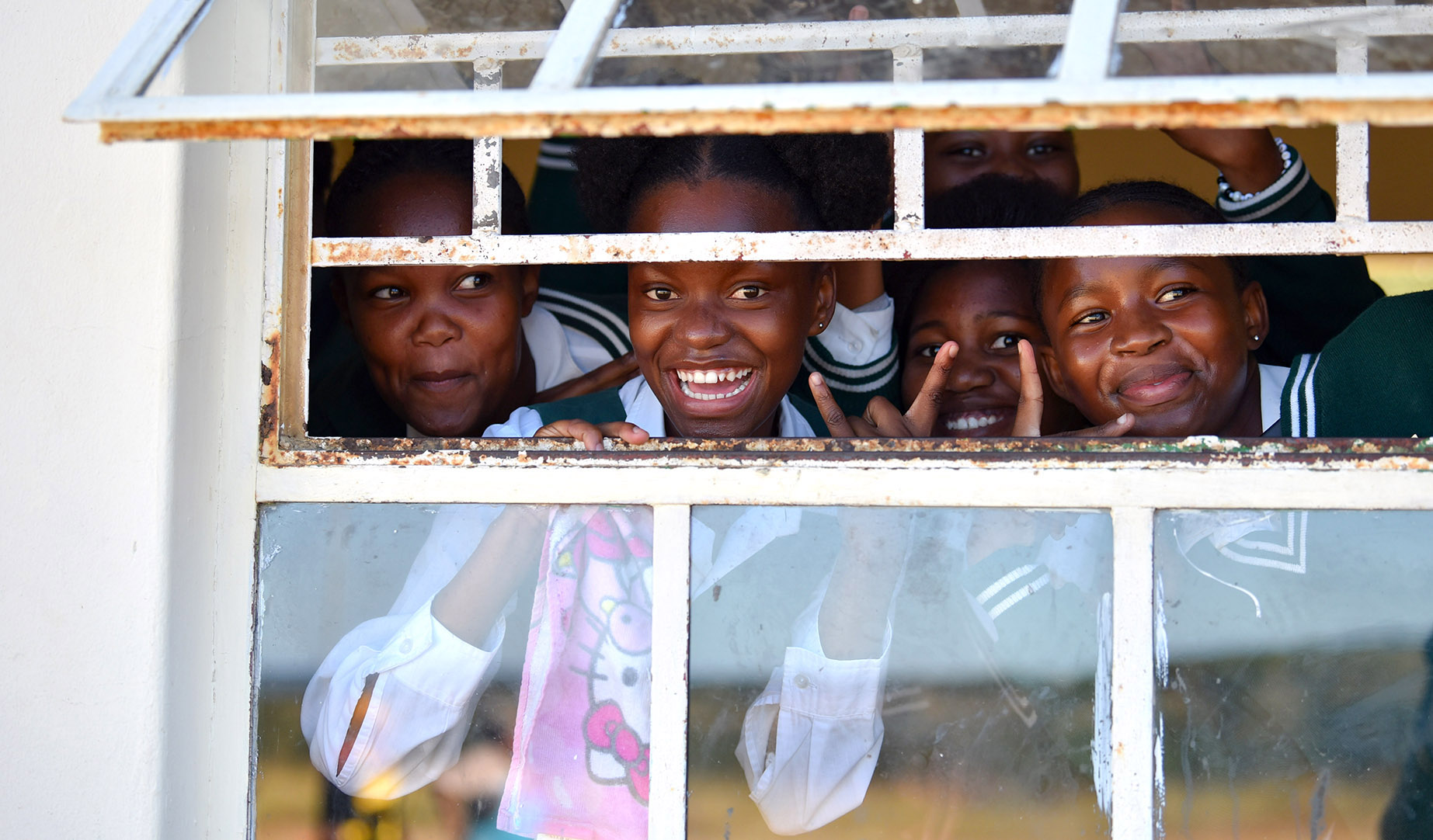
After receiving a morning snack after they reach school, learners from Ntabenkonyana Senior Secondary in the Eastern Cape are ready to tackle their day (Photo: Deon Ferreira)
“This is an impossible situation. Not only does this take away their dignity. It is dehumanising. We understand parents are holding back their children because they can’t make this long journey. When it rains their clothes are wet and they will be freezing.
“When you talk about 30 years of democracy you can’t say that these children are enjoying the fruits of democracy,” he said. “People have been left out.
“This road is very difficult to walk. I am a hiker and I am wearing the right shoes. I can tell you these kids are wearing school shoes. This road is very steep. It is rocky. It is uneven,” Madlingosi said.
“Our mandate is to promote and protect human rights. Part of that is to monitor the implementation of human rights. I wanted to see the conditions for myself,” he said.
“It is worse than I thought. We just walked now for just over an hour. Weather conditions were fine today, but I can just imagine what happens when it is winter, when it is raining and snowing. The roads are non-existent. The kids are very, very young. I can’t imagine how they walk for an hour.
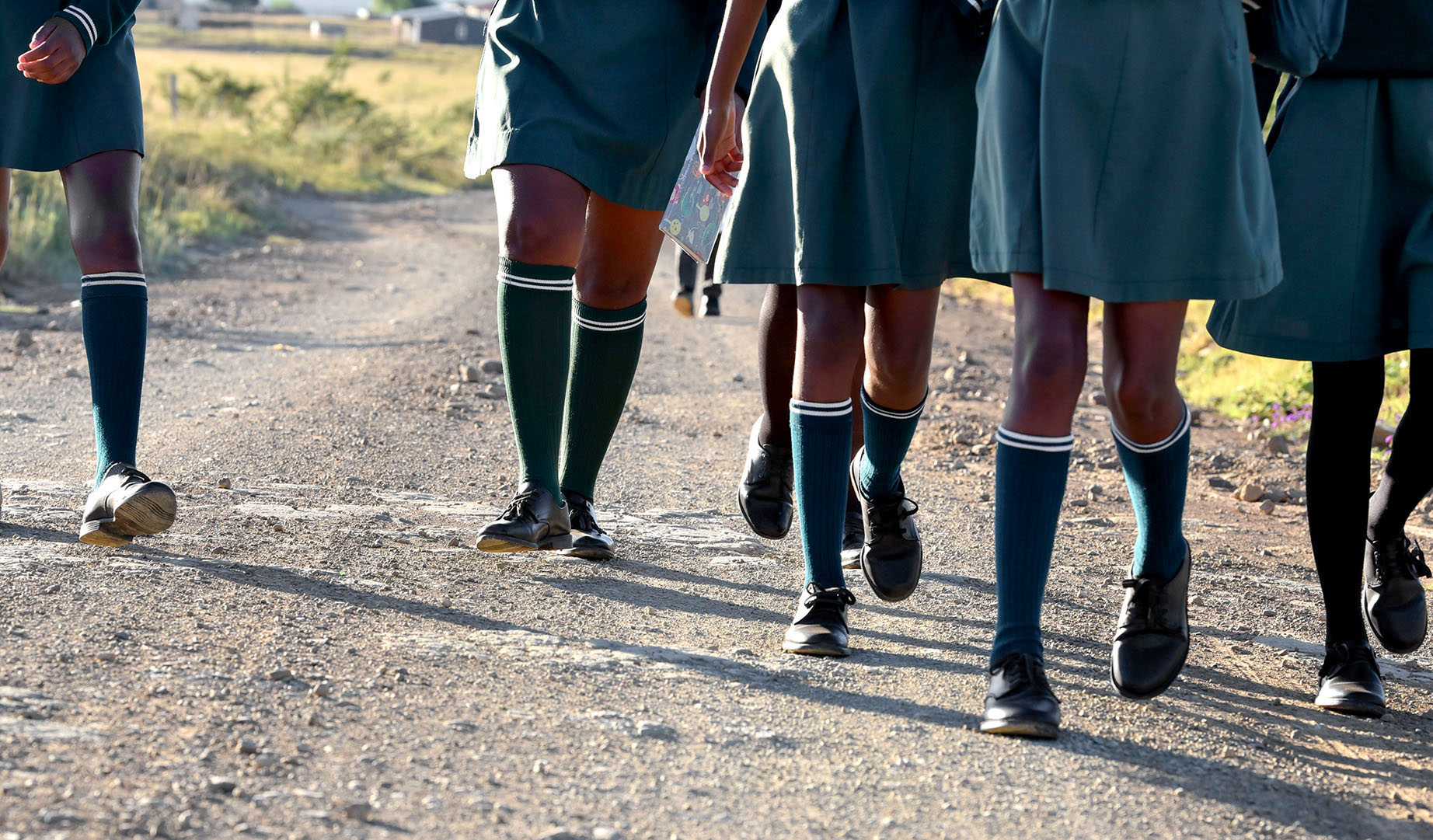
Learners from Ntabenkonyana Senior Secondary School in the Eastern Cape on their daily 20km walk to and from school. (Photo: Deon Ferreira)
“It is not only an issue for education. It implicates the right to equality. The right to dignity and the right to safety. This can be unsafe, especially for girl children, being raped, being robbed and there is even a risk of human trafficking.
“We wanted to see for ourselves and journey with the kids. I am going to meet with the Speaker of the Eastern Cape legislature. I want to know what they are doing about it. Those budget cuts cannot be justified. The right to education cannot be limited. You cannot use budget as an excuse. There are budget issues but there are perhaps issues of maladministration and corruption. I don’t know. We have to look at this,” Madlingosi said.
Early warning from the AG
In 2016, the Auditor-General (AG) published a special audit report focusing on learner transport in the Eastern Cape. At the time, about 95,000 learners qualified for free transport but only 37,762 received it.
“The performance audit found that learner transport services were not economical in all instances. More learners could have been transported at the cost paid for transporting learners on certain routes. The main root causes of the uneconomical learner transport were the uneconomical implementation of the learner transport scheme’s tariff and cost structure and the fact that a competitive bidding process was not followed to appoint transport service providers and transport operators,” the report stated.
“Other causes included a reliance on service providers to administer and manage the learner transport scheme, poor demand management, poor route design, inaccurate data and poor monitoring and reporting.
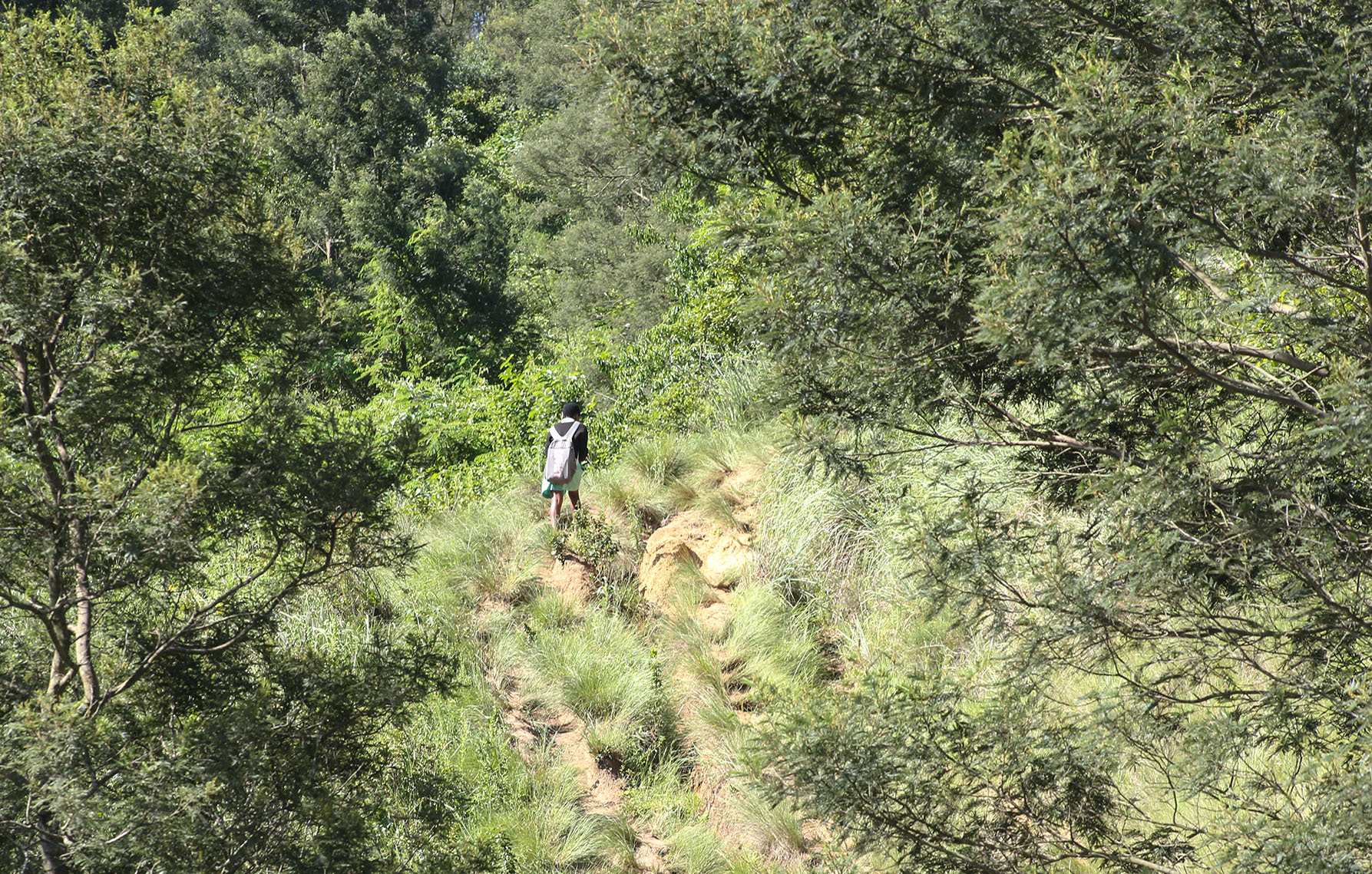
A young learner from Ntlozelo Primary School in Mbizana in the Eastern Cape walks home as no school transport provision was initially made for them. (Photo: Hoseya Jubase)
“The respective role players did not properly plan and coordinate the learner transport function before it was transferred to the Eastern Cape Department of Transport from the Eastern Cape Department of Education,” it said.
Five years later, the AG said the problem had persisted in the 2021/2022 financial year.
It warned of overpayments for learner transport “based on inaccurate data for the distances claimed due to inadequate monitoring controls”.
In October 2023, the AG again highlighted scholar transport as a major concern in the province stressing “significant internal control deficiencies”.
It stated: “Continued misuse of state resources and persistent weaknesses in systems of transparency, accountability and performance are of significant concern.”
This included the lack of a digital system and controls to track payments.
“It also stated that the department could not fund its obligations towards scholar transport operators for the 22/23 financial year and consequently incurred R131.6-million in unauthorised expenditure,” said Marshall von Buchenroder, a DA member of the Eastern Cape legislature, who has been fighting tirelessly for an improved learner transport system.
The AG recommended that the department implement digital systems to monitor learner transport and improve payment systems for transport operators. This was done this year in February on order of the province’s executive committee, but only after the system faced imminent collapse.
Conditional budget
In response to questions from Daily Maverick, the Eastern Cape government noted the budget allocated to learner transport provided for an increased number of beneficiaries, plans to find sustainable funding for hostel accommodation for learners travelling more than 40km a day and the roll-out of a new system to improve monitoring.
According to the provincial budget delivered in February, R2.2-billion has been set aside to provide learner transport over the next three years with R725-million allocated to 2024.
However, the allocation came with a condition. “The two departments involved in this programme must improve on governance and efficiency in terms of providing credible data in the number of kilometres of roads and routes as well as the capacity of vehicles,” MEC for Finance Mlungisi Mvoko said.
“Operating costs to transport 103,000 learners exceed R100-million a month, so even with the most reserved calculations, the programme is out of money. This was backed by taxi operators, who have confirmed that many scholar operators have not been paid since November last year,” Von Buchenroder said at the time.
The unfunded budget for learner transport was the reason that the DA in the Eastern Cape opposed the passing of the adjustment budget at the end of 2023. The budget was passed anyway.
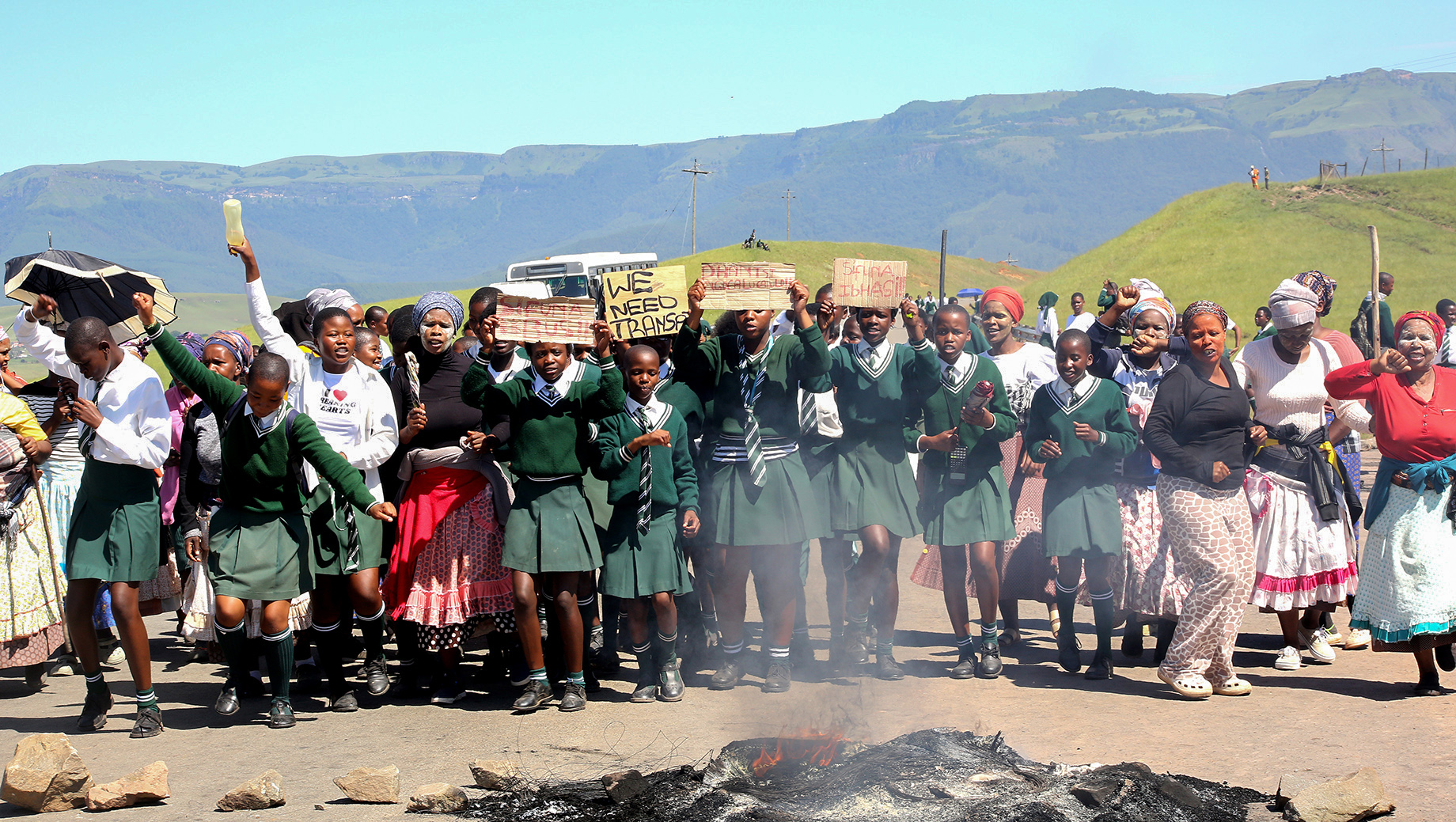
Children excluded from the province’s scholar transport system protest in January this year in Tabase, Mthatha, Eastern Cape. (Photo: Hoseya Jubase)
But as protests and a growing call for action spread across the province in February, the provincial executive committee had to approve interim budget relief of R90.37-million to enable the Department of Transport to provide learner transport.
Extending the service from 90,917 to 103,000 learners was also approved.
The Eastern Cape executive committee further directed the departments of Transport and Education to “identify sustainable funding models and conduct a cost-benefit analysis of placing learners that travel more than 40km daily in hostels”.
The exco also noted and approved the use of new software to monitor the service in future. DM



















Failure to address these hardships for South Africa’s rural citizens makes a mockery of any claim to equitable access to education for all children; it continues and entrenched intergenerational poverty.
Its a tragedy. Government should be ashamed! Out of interest, I would like to know what the voting stats are in this area over every election since 1994.
For decades already, the Eastern Cape has been a solid ANC constituency.
These learners’ parents vote for this, time after time. The kids grow up and then vote for this too, so their own kids also have to walk long distances.
People truly get what they vote for. Blame the poor quality of the electorate for this.